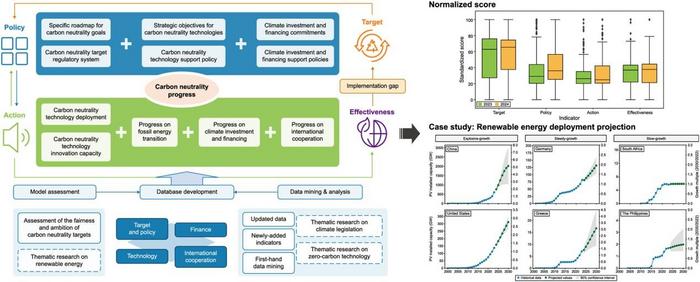The global commitment to carbon neutrality is gaining unprecedented momentum; however, the chasm between declarations and tangible actions is widening. A pioneering study evaluating the policies and actions related to carbon neutrality across 197 countries reveals a significant disparity in implementation effectiveness. Specifically, while 151 nations have announced their intentions to achieve carbon neutrality, a mere 72 have established comprehensive frameworks that align governmental actions with their climate ambitions. This alarming statistic serves as a stark reminder that proclamations devoid of execution will not yield the transformative change necessary for averting climate catastrophes.
The current trajectory indicates that, by 2030, the worldwide renewable energy capacity will only escalate to an inadequate 2.7 times its level in 2022, failing to satisfy the critical tripling objective established in various scientific assessments. Such findings deliver an urgent message: without compelling policy enforcement, international collaboration, and a sustained influx of investments, nations will struggle to meet their ambitious climate targets. The implementation gap, illustrated in the study, has paved a concerning path that must be collectively addressed—especially in light of the mounting consequences of climate change.
The continued progress toward mitigating climate change has emerged as one of the most pressing challenges of our era. The 2015 Paris Agreement has urged countries to unite in their efforts to constrain global temperature increases to well below 2°C. By the beginning of 2024, 151 countries had made their pledges toward carbon neutrality, collectively echoing the commitment of 198 parties engaged in the UN Framework Convention on Climate Change to develop and enforce climate laws. Yet, several key challenges remain on this fragile journey, including discrepancies in economic resources, technological capabilities, and robust policy implementation strategies.
A more granular examination of renewable energy deployment indicates that many nations are lagging considerably in their aspirations. While the study highlights that global commitments are widespread and legally recognized, the absence of substantive policies has stymied progress. In particular, it has been noted that 120 out of the 151 countries have infused these pledges into legal frameworks; however, the divergence between legislation and actionable policies persists, contributing to a disjointed global approach toward climate solutions.
The assessment brings into focus the stark regions of disparity in renewable energy adoption. Reportedly, countries like China, the United States, and members of the European Union are leading the charge in renewable energy expansion. Conversely, developing nations find themselves constrained by a lack of financial support and technological sophistication that inhibit their ability to advance toward sustainable energy solutions. The need for more equitable commitments and collaborative frameworks that foster genuine partnerships for technology sharing and financial investment has never been more crucial.
Lead author Prof. Wenjia Cai emphasizes that while there is an increase in global commitments, the crux of the challenge revolves around converting these promises into concrete policies and measurable advances. As the urgency of climate change escalates, so too must the efforts for international cooperation and financial backing, especially aimed at supporting developing countries—a demographic often most vulnerable to climate impacts.
This comprehensive study unveils that many developing regions are grappling not only with financial constraints but also with gaps in technological investment, seamlessly hampering their ability to realize climate goals. Therefore, the importance of tailored strategies that resonate with the unique contexts and resource availabilities of different nations emerges as critical in the transition toward carbon neutrality.
The implications of the findings in this research are substantial and call for escalated actions in transparency, financing, and international cooperation, all vital for bolstering efforts toward carbon neutrality. A collaborative approach that breaks down barriers to technology diffusion is pivotal; developing nations must be integrated into the global dialogue and decision-making processes occurring at climate summits and conferences.
Moreover, the established research underscores the urgent necessity of targeting specific barriers that developing nations face. This involves not only amplifying financial assistance but also guaranteeing infrastructural development and skill-building initiatives that enable these countries to implement sustainable energy solutions effectively. A multifaceted commitment toward resource allocation will serve as a cornerstone for cultivating a resilient and sustainable energy landscape across the globe.
In concert with the calls for international collaboration, the study invites a paradigm shift in how nations view and configure their climate strategies. It posits that national governments must embrace a holistic approach that marries financial commitments with innovative technological investments, thereby addressing the underlying factors contributing to the implementation gap that plagues carbon neutrality ambitions.
The study’s conclusions have significant implications for global climate policy, particularly emphasizing the need for a cohesive framework that guarantees accountability and efficacy in transitioning toward a carbon-neutral future. This forward-thinking perspective on international cooperation can yield dividends in the fight against climate change—if nations are willing to transcend rhetoric and embrace action-oriented policies that deliver measurable impacts.
Ultimately, this comprehensive strategic overview provided by the study consolidates around a clarion call for collective responsibility and proactive engagement at various levels of government and society. By fostering a culture of cooperation grounded in shared objectives and transparency, countries can align their ambitions with actionable policies that not only address climate challenges but also enhance global equity and foster sustainable growth.
The significance of this study transcends academia; it resonates with educators, policymakers, and civil society, offering an insightful narrative that can galvanize global action toward realizing the potential of carbon neutrality. Engaging a multitude of stakeholders in this discourse—the scientific community, governments, industries, and citizens—will be critical in steering their commitments and collaborations toward a sustainable future where climate promises reflect true changes on the ground.
By harnessing the full potential of knowledge and technology, nations can firmly close the implementation gap and catalyze progress in the global journey to climate resilience and sustainability.
Subject of Research: Carbon Neutrality Implementation
Article Title: Global readiness for carbon neutrality: From targets to action
News Publication Date: 3-Mar-2025
Web References: Link to study
References: DOI: 10.1016/j.ese.2025.100546
Image Credits: Environmental Science and Ecotechnology
Keywords: Climate Policy, Renewable Energy, Carbon Neutrality, International Cooperation, Sustainable Development, Climate Change Mitigation.




